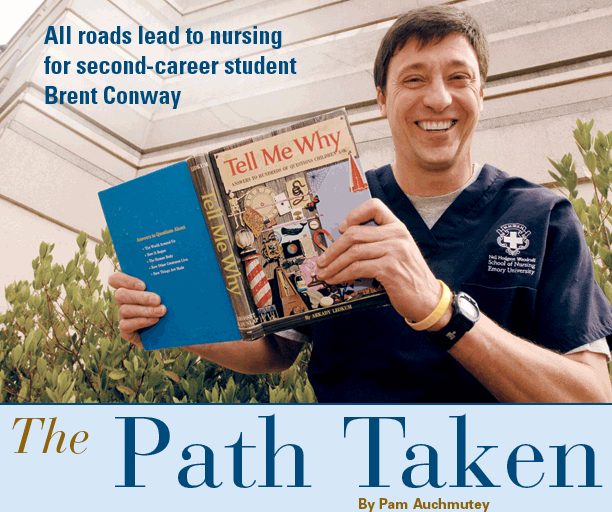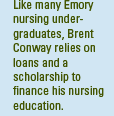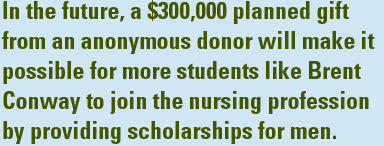













|
 |
 |
 rent
Conway is a tell-me-why kind of guy. As a youngster, he tinkered
in his father’s garage, taking things apart, figuring out
how they worked, and putting them back together. rent
Conway is a tell-me-why kind of guy. As a youngster, he tinkered
in his father’s garage, taking things apart, figuring out
how they worked, and putting them back together.
“I’ve always been one
of those people who asks why,” says Conway, who graduates
from the School of Nursing with a BSN degree in May. “My parents
got me a book, Tell Me Why. Why are clouds in the sky? What are
clouds made of? How does a lock work? All those books published
back in the 1960s to answer questions, I wore them out.”
Now 48, this child of the sixties
is still asking “Why?” as a second-career student in
the School of Nursing. “Everything we come across, whether
it’s how drugs work in the body or how the heart works, fascinates
me,” says Conway. “This is the perfect career for me
to be in. The only problem I have is learning to corral wanting
to know everything now.”
The urge to learn has led Conway down
different paths in his professional life, from earning a degree
in landscape architecture, to managing site development and construction
for various hospitals, to serving as finance administrator for the
School of Law at Emory. His resumé includes working at Children’s
Healthcare of Atlanta at Egleston, where his admiration for nurses
and doctors deepened, so much so that he began to think about a
career in medicine or nursing. He put off a decision and joined
the law school but eventually discovered how much he missed health
care. It was only a matter of time until he enrolled in the nursing
school in fall 2004.
To cover his tuition, Conway received
the Ellen Bowden Scholarship and took out “lots and lots of
loans.” He is not alone, since 95% of Emory nursing undergraduates
receive some form of financial aid.
“Coming here has been phenomenal,”
says Conway. “The quality of the students and the faculty
just blows my mind. I know that I have developed friendships that
will last for the rest of my life.” |
 |
| |
|
|
| |
 |
|
| |
|
|
 |
In
the minority |
 |
 |
 he
fact that Conway is in the minority—he is one of 17 men among
204 Emory nursing undergraduates—has not given him a moment’s
pause. That sentiment should bring comfort to those concerned about
the nursing workforce shortage and the need to recruit future nurses
from a variety of backgrounds. he
fact that Conway is in the minority—he is one of 17 men among
204 Emory nursing undergraduates—has not given him a moment’s
pause. That sentiment should bring comfort to those concerned about
the nursing workforce shortage and the need to recruit future nurses
from a variety of backgrounds.
A new planned gift to the School of
Nursing will help. In time, the $300,000 gift will provide scholarships
specifically for male students. The donor, a retired male nurse
who wishes to remain anonymous, made the scholarship bequest to
attract more men to nursing, while making their education more affordable.
Increasing scholarship support will be a priority for the nursing
school during Emory’s university-wide fund-raising campaign,
set to officially begin in 2007.
“Nursing has been good to me,
and I wanted to help other male students have the career opportunities
I have enjoyed with this profession,” says the donor, a second-career
nurse who practiced and taught nursing students in the Atlanta area.
“Nursing provides great job security, with marketability and
mobility. There are so many areas you can work in. Besides floor
nursing, you can move into other areas like risk management, quality
assurance, infection control, patient education—it’s
endless. Each area provides you with new challenges, new skills,
and new learning opportunities, so you’re stimulated all over
again.”
The donor crossed paths with nursing
students before and after embarking on his nursing career. He taught
anatomy and physiology to nursing students as a college instructor
and clinical skills as a nursing instructor at the bedside and in
the classroom. “I love teaching,” he says. “They
were great students to teach, still are, and always will be.”
Conway is also drawn to the idea of
teaching, something his clinical instructors have emphasized from
day one. When Conway mastered changing a dressing on a patient’s
central line, he turned right around and taught the procedure to
another student. As his clinical instructor told him: “Do
it once, teach it once, and you’ll never forget it.”
“That’s one of the things
I really like about the nursing school,” says Conway, who
is leaning toward pediatric nursing after graduation. “They
don’t give you the easy way out. They want you to find the
answer yourself. It’s a matter of being self-sufficient. Of
course you’re going to have to ask another nurse for help.
But when you need more information, you need to know where to go,
where to look things up.” |
 |
| |
|
|
 |
| |
 |
|
 |
Men
in the Nursing Profession |
 |
 |
•
The 2004 National Sample Survey of Registered Nurses conducted
by the U.S. Division of Nursing found that 5.7% of RNs are
men. That’s a slight drop from 5.9% in the 2000 survey.
• Currently, 8% of BSN
students enrolled in the the School of Nursing are men, compared
with the national average of 8.4%. The Office of Admission
reports that all 17 male BSN students rely on scholarships
and/or financial aid to pay for their education.
• According to the 2004
annual survey conducted by the Association of American Colleges
of Nursing, 13,271 of 147,170 students enrolled in baccalaurate
nursing programs are men. |
 |
| |
 |
|
|
 |
| |
|
|
| |
|
|
|
|
|